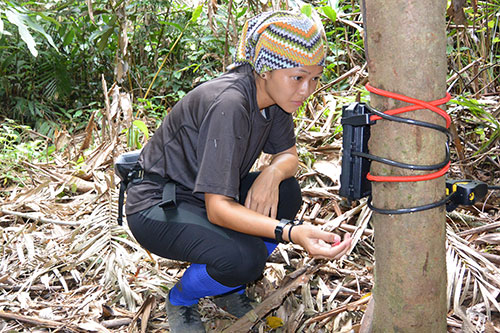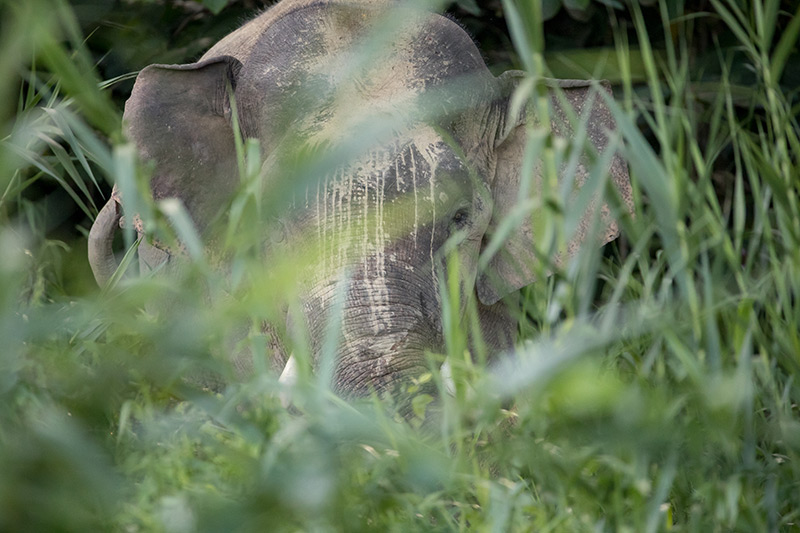MALAYAN TIGER CONSERVATION
Securing a Future for Tigers
A POPULATION ON THE BRINK
In the past 150 years tigers have lost over 95% of their habitat and over 95% of their population. They face tremendous pressure from poaching for the illegal wildlife trade and other threats including habitat loss, logging and other human developments. However, after bottoming out at only perhaps 3,200 tigers left in the wild, concentrated conservation efforts have seen populations begin to bounce back. Currently there are estimated to be about 4,500 tigers in the wild, a considerable increase from just 20 years ago -- a real conservation success story!
The Malayan tiger is one of six subspecies of tigers and lives only on the Malay Peninsula and in the southern tip of Thailand. The population for Malayan tigers is dangerously low—fewer than -300 survive in their natural range.
In an effort to save these iconic big cats from extinction, in 2012 Woodland Park Zoo created a partnership with Panthera and Rimba, an in-country field partner of the zoo, to launch the Malayan Tiger Conservation Project. This project is now entering its second 10-year initiative with the Terengganu State Government to protect tigers in and around Taman Negara National Park in peninsular Malaysia.
PARTNER SPOTLIGHT
Woodland Park Zoo Partners
This Malayan Tiger Program builds partnerships and works with The Malaysian Department of Wildlife and National Parks (Perhilitan) and other government agencies and non-profit organizations to save wild tigers by stopping illegal poaching, monitoring tigers and prey species, alleviating tiger-human conflict, building indigenous capacity to manage resources, and working to protect more tiger habitat. Our original on-ground partner, Rimba, has recently split its staff into two national non-profit organizations. Panthera-Malaysia continues the monitoring, anti-poaching patrols, and tiger conflict alleviation efforts, while Nature Based Solutions will continue to focus on protecting more tiger habitat in the region through innovative green financing mechanisms.
Good News for Tigers

Back from the Brink
In 2012, there was no reliable evidence of tiger presence in Taman Negara National Park. Today we have confirmation of a significant population, reproduction, and cubs surviving in to sub-adulthood.

Justice for Tigers
Patrol teams are experiencing successful capture and prosecution of poachers through vigilance mapping, identifying targeted patrol sectors and incursion locations.

A Boost for all Local Wildlife
In addition to Malayan tigers, the project area is helping to protect SE Asia’s largest population of Asian elephants.

More Protected Land
In May 2018, the state government authorized the addition of another 10,386 hectares of newly protected tiger habitat.
WHAT YOU CAN DO
Habitat loss and poaching are among the biggest threats to all tiger species, including those found in Malaysia. The worldwide demand for palm oil, used in many foods and household products, has led to a landscape dominated by palm plantations—fragmenting what little habitat is left for tigers. One of the most important thing you can do to protect tigers and all wildlife that shares their habitat is to choose foods and products made by companies committed to certified sustainable palm oil. Read labels and look for certification from the Roundtable for Sustainable Palm Oil (RSPO), or download the Cheyenne Mountain Zoo app.
About Malayan Tigers
One of six subspecies of tigers and ranges in peninsular Malaysia
The males, larger than females, weigh on average between 220 and 264 pounds. Fewer than 300 Malayan tigers remain in the wild, facing primary threats such as poaching for their skins and body parts for traditional medicine, habitat loss, agricultural, logging and other human developments, and retaliatory killing by farmers for attacks on livestock.
MORE WAYS TO HELP